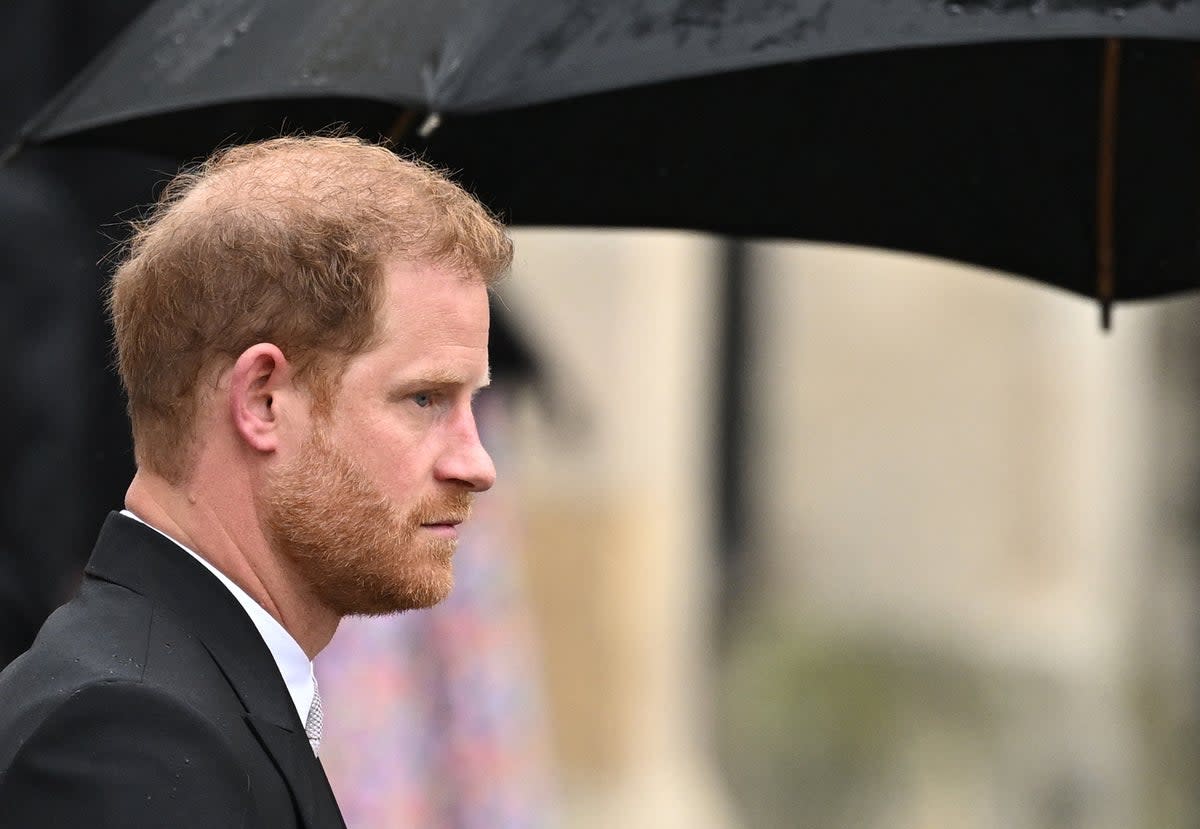Voices: What we can learn from the role Harry played in the coronation

- Oops!Something went wrong.Please try again later.
- Oops!Something went wrong.Please try again later.
- Oops!Something went wrong.Please try again later.
A historian of Europe’s royal dynasties spends a modern-day coronation scanning the crowd shots, looking for who was sitting where, next to whom. Junior royals, second sons in particular, who once enjoyed premier positioning, usually find themselves eventually in the third row or tucked out of the way into a corner.
One of the most frustrating moments in the life of any royal spare, in the history of the United Kingdom or any traditional monarchy, is when you realise you’re no longer “the spare”, but instead just another spare. Dynastic history is full of stories of royal brothers whose close relationships were dashed once the younger sibling was pushed too far away from the spotlight to have any more serious political or social weight.
Princess Margaret realised she no longer commanded centre stage once her older sister Elizabeth started having children. Queen Victoria’s uncles, having been “next in line” for so much of their lives, became increasingly marginalised when she too began having children.
Further back in history, French king Louis XIV had an extremely close bond with his younger brother Philippe, while their uncle, Gaston went to the countryside to sulk; but here too, once a Dauphin was born, Philippe was side-lined and the relationship broke down. Go back even further and we have an uncle so annoyed, of course, he kidnapped his royal nephews and they disappeared forever within the Tower of London.
So all eyes were on Prince Harry, Duke of Sussex, this morning when he made his first major appearance in the United Kingdom as a member of the extended royal family since the Netflix documentary and the publication of his book Spare earlier this year. As predicted, he slipped in to Westminster Abbey almost un-noticed with the rest of the royal herd, comfortably sandwiched between his two closest allies, the York sisters Beatrice and Eugenie, then swiftly exited while all eyes were on the gold state coach rolling down the Mall at the end of the ceremony.
He very notably did not appear for the group wave from the balcony of Buckingham Palace. In the few glimpses we saw of his time at the coronation, the duke looked uncomfortable and isolated. Seated in the third row, it was indeed interesting to see he had been displaced by the dukes of Gloucester and Kent whom he outranks in strict order of precedence. But in a kinder gentler modern monarchy, perhaps it is simply polite to offer these seats to elderly relatives.
I think to be completely fair to the prince, his role as “the spare” has been played up much more by the press than any of his predecessors, especially since 1997. The palace certainly played along, seeing Harry’s popularity as a great PR boon.
Think back to the previous generations: no one ever would have said that Prince Andrew had “legions” of fans – even at the height of his and Fergie’s popularity in the late 1980s. And we could make a similar case for Princess Margaret in the 1950s, or George VI’s younger brothers, the Duke of Gloucester or the Duke of Kent in the 1930s. Each of them did have their moment – in a way playing an important role in counter-balancing the seriousness of their older sibling, the sovereign. Kent should have a big screen drama produced about his life: it would raise some eyebrows…
One of the troubles with being a member of the British royal family since the loss of real political power in the early years of the eighteenth century – any member except the sovereign – is that there is usually no defined role for you to perform. Even the heir was rarely given anything specific to do.
And so in the Hanoverian era, sons formed rival political factions, often in direct opposition to their fathers. Or they spent lavish sums of money on villas by the sea or playing cards and entertaining the beau monde. Victoria and Albert tried to ensure their younger sons were given things to do, appointing them to positions in the navy or the army, sending them on tours of the colonies.
But idleness and boredom continued to stalk many of the younger princes, and scandal sometimes followed closely behind. Does anyone else recall the story of Prince Eddy, and the claims that he was involved in the Cleveland Street telegraph boy scandal? Or worse, that he was Jack the Ripper himself?
So like most people, I agree that the compromise struck between the feuding Windsors with regards to the coronation of Charles III was a good one: Harry would come to London, while Meghan stayed in California. It satisfied a need for dynastic unity, something deeply important for royal rituals like a coronation or a funeral, but also ensured that the media focus would be on the main activity of the day.
My wish is that the Duke of Sussex finds his way – as previous spares always have, eventually – and carves out an important and fulfilling role for himself and his family, whether in the US or the UK. He has plenty of role models: his fairly close cousins in the royal houses of Denmark, Spain and Sweden, are younger siblings who have transitioned quite easily out of the spotlight and into private lives.
Harry can choose to continue as a sort of representative of the Windsors abroad, or he can choose to lead a completely private life, perhaps simply as Mr Harry Sussex. In a sense, this spare is luckier than his historical predecessors, who really did not have that choice.
Dr Jonathan Spangler is a history lecturer at Manchester Metropolitan University, whose research focuses on Europe’s royal and aristocratic families

